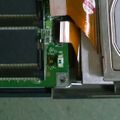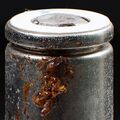NEC VERSA 2760MT: Difference between revisions
(Update info) |
|||
| (7 intermediate revisions by 2 users not shown) | |||
| Line 7: | Line 7: | ||
|Capacitor Types = Aluminum Electrolytic, Tantalum, Ceramic, Polymer | |Capacitor Types = Aluminum Electrolytic, Tantalum, Ceramic, Polymer | ||
|Leak Risk = High | |Leak Risk = High | ||
|Batteries = Yes, CMOS | |Batteries = Yes, NiMH for CMOS + RTC and Li-Ion for main battery | ||
|Destructive Entry = Yes, brittle plastics, sealed external PSU brick | |Destructive Entry = Yes, brittle plastics, sealed external PSU brick | ||
}} | |CPU=Intel Pentium MMX @ 166 MHz|Memory=16 or 32 MB (upgradeable to 128 MB)|Memory Type=EDO DRAM (socketed)|Storage=1x 2.5in 2.1 GB IDE HDD (up to 4 GB)|Graphics=NeoMagic MagicGraph 128XD (2 MB VRAM)|Display Interface=12.1" SVGA TFT Display, SVGA output|Sound=16-bit Sound Blaster PRO|Input Voltage=19 V DC|Current=2.4 A}} | ||
The NEC VERSA 2760MT is a PC laptop from 1997 with a 166 MHz Intel Pentium MMX CPU and NeoMagic MagicGraph 128XD GPU. | The NEC VERSA 2760MT is a PC laptop from 1997 with a 166 MHz Intel Pentium MMX CPU and NeoMagic MagicGraph 128XD GPU. | ||
| Line 60: | Line 60: | ||
== Disassembly Notes == | == Disassembly Notes == | ||
''See [[Disassembly:NEC_VERSA_2760MT|disassembly]] tab for step-by-step guide.'' | |||
*The plastic in this device is thin and extremely brittle, the design relies on the rigidity of the PCBs to support the weight of the device, '''you are very likely to break plastic pieces when attempting a repair'''. | *The plastic in this device is thin and extremely brittle, the design relies on the rigidity of the PCBs to support the weight of the device, '''you are very likely to break plastic pieces when attempting a repair'''. | ||
*While this device uses machine screws and threaded metal inserts molded into the plastic case the plastic will shear easily. | *While this device uses machine screws and threaded metal inserts molded into the plastic case the plastic will shear easily. | ||
| Line 66: | Line 68: | ||
*Use ESD safe equipment | *Use ESD safe equipment | ||
== Original Parts == | === Recommended Tools === | ||
=== Motherboard === | {| class="wikitable" | ||
|+ | |||
Fastener Drivers | |||
!Fastener Types | |||
!Sizes | |||
!Notes | |||
|- | |||
|Phillips | |||
|#0 | |||
|Recessed screws require thin driver shaft | |||
|- | |||
|Hex Nut | |||
|5 mm | |||
|For rear IO ports | |||
|} | |||
{| class="wikitable" | |||
|+ | |||
Other Hand Tools | |||
!Tool | |||
!Notes | |||
|- | |||
|Tweezers | |||
|Removing FFC cables, retrieving screw and general manipulation | |||
|- | |||
|Plastic Pry Tool | |||
|To open FFC ZIFs and push in LCD connectors | |||
|- | |||
|Fastener Organizer | |||
|There's a lot of similar screws but with different lengths, head shapes and threads | |||
|} | |||
==Original Parts == | |||
===Motherboard=== | |||
''RT6 R6MB VER=0.5A'' | ''RT6 R6MB VER=0.5A'' | ||
<gallery> | <gallery> | ||
| Line 76: | Line 110: | ||
=== IO Board === | ===IO Board=== | ||
''RT6 R6IO VER=0.4D'' | ''RT6 R6IO VER=0.4D'' | ||
<gallery> | <gallery> | ||
| Line 84: | Line 118: | ||
</gallery> | </gallery> | ||
=== CPU Board === | ===CPU Board=== | ||
''RT6 R6CPU VER=0.3'' | ''RT6 R6CPU VER=0.3'' | ||
===Removable Battery=== | |||
<gallery> | |||
File:18650-leak-1.jpg|alt=Leaking 18650 cell from disassembled battery|Leaking 18650 cell from disassembled battery | |||
</gallery> | |||
==Replacement Parts== | ==Replacement Parts== | ||
Repairs conducted removed CN8, CN65 and SW50, so no replacement parts were sourced. However those appear to be Molex MicoBlade connectors and an unknown possibly wide SSOP style DIP double switch. | Repairs conducted removed CN8, CN65 and SW50, so no replacement parts were sourced. However those appear to be Molex MicoBlade connectors and an unknown possibly wide SSOP style DIP double switch. | ||
== Related Links == | ==Related Links== | ||
== References == | ==References== | ||
<references /> | <references /> | ||
[[Category:Computer]] | [[Category:Computer]] | ||
[[Category:1990s]] | [[Category:1990s]] | ||
[[Category:WorkNeeded:OriginalParts]] | |||
[[Category:WorkNeeded:ReplacementParts]] | |||
Latest revision as of 09:19, 28 July 2024
| This device is in the WorkNeeded:OriginalParts category because it was flagged as missing information on the original parts. It may have replacement parts listed but those cannot be assumed to be identical to the originals. If you have a list of the original parts, please feel free to add them by copying the relevant table from EditorsToolbox:Tables |
| This device is in the WorkNeeded:ReplacementParts category because it was flagged as missing information on replacement parts. If it has the original parts listed you may be able to search for replacements using the parametric searches available from parts distributors. If you have or make a list of replacement parts, please feel free to add them by copying the relevant table from EditorsToolbox:Tables |
| Preliminary Information | |
|---|---|
| Release Year | 1997 |
| Leak Risk | High |
| Batteries | Yes, NiMH for CMOS + RTC and Li-Ion for main battery |
| Mounting Technology | Through Hole, SMD, QFP, BGA, ZIF Sockets, FFCs, High Density Interconnects |
| Capacitor Types | Aluminum Electrolytic, Tantalum, Ceramic, Polymer |
| Destructive Entry | Yes, brittle plastics, sealed external PSU brick |
| Hardware Specifications | |
| CPU | Intel Pentium MMX @ 166 MHz |
| Memory Capacity | 16 or 32 MB (upgradeable to 128 MB) |
| Memory Type | EDO DRAM (socketed) |
| Storage | 1x 2.5in 2.1 GB IDE HDD (up to 4 GB) |
| Graphics | NeoMagic MagicGraph 128XD (2 MB VRAM) |
| Display Interface | 12.1" SVGA TFT Display, SVGA output |
| Sound | 16-bit Sound Blaster PRO |
| Power Requirements | |
| Input Voltage | 19 V DC |
| Current (Amps) | 2.4 A |
The NEC VERSA 2760MT is a PC laptop from 1997 with a 166 MHz Intel Pentium MMX CPU and NeoMagic MagicGraph 128XD GPU.
Known Issues
Unit does not turn on but battery charges or frequently encounters errors during boot sequence
CMOS NiMH battery has died
- The rechargeable NiMH CMOS battery has a finite cycle life and will fail
- If infrequently used the NiMH CMOS battery will leak
-
First boot error
-
Second boot error
-
Damage to Motherboard
Solutions
- Remove or replace NiMH CMOS battery
- Repair any corrosion damage from leaks
- The computer will still boot without a CMOS battery however date/time and any configuration will not be retained
- SW50 can be removed and the computer will still boot, I have no clue what it does
-
Motherboard after corroded components removed
-
IO Board after corroded components removed
Unit lags heavily or freezes or turns off suddenly when running demanding applications
Thermal interface material between CPU and heatsink is bad
- The thermal paste will eventually dry out
- The thermal paste will eventually be 'pumped-out'
- This leads to poor thermal performance and overheating
Solutions
- Check rear fan is functional
- Clean dust from heatsink & fan
- Replace thermal paste on both top heat spreader, bottom heat spreader and CPU board package heat spreader.
-
Replaced thermal paste
Unit does not turn on or charge, PSU LED does not illuminate
Mains charger PSU has failed
- Unknown failure mode
-
Label on the mains power adapter
Solutions
- Attempt to repair original charger (difficult, glued/ultrasonically welded case)
- Buy new charger with correct specifications (19 V 2.4 A DC) with NEC charger adapter (or splice existing charge cable)
Disassembly Notes
See disassembly tab for step-by-step guide.
- The plastic in this device is thin and extremely brittle, the design relies on the rigidity of the PCBs to support the weight of the device, you are very likely to break plastic pieces when attempting a repair.
- While this device uses machine screws and threaded metal inserts molded into the plastic case the plastic will shear easily.
- There are a number of thin flat-flex cables and locking/hinged FFC ZIFs in this device, they are difficult to manipulate and prone to damage.
- There are a number of high density interconnects in this device, they must be disconnected and connected by applying even force without twisting the connectors to avoid damage.
- Use ESD safe equipment
Recommended Tools
| Fastener Types | Sizes | Notes |
|---|---|---|
| Phillips | #0 | Recessed screws require thin driver shaft |
| Hex Nut | 5 mm | For rear IO ports |
| Tool | Notes |
|---|---|
| Tweezers | Removing FFC cables, retrieving screw and general manipulation |
| Plastic Pry Tool | To open FFC ZIFs and push in LCD connectors |
| Fastener Organizer | There's a lot of similar screws but with different lengths, head shapes and threads |
Original Parts
Motherboard
RT6 R6MB VER=0.5A
-
RT6 R6MB (Version 0.5A) PCB
-
RT6 R6MB (Version 0.5A) PCB Top Side
-
RT6 R6MB (Version 0.5A) PCB Bottom Side
IO Board
RT6 R6IO VER=0.4D
-
RT6 R6IO (Version 0.4D) PCB
-
RT6 R6IO (Version 0.4D) PCB Top Side
-
RT6 R6IO (Version 0.4D) PCB Bottom Side
CPU Board
RT6 R6CPU VER=0.3
Removable Battery
-
Leaking 18650 cell from disassembled battery
Replacement Parts
Repairs conducted removed CN8, CN65 and SW50, so no replacement parts were sourced. However those appear to be Molex MicoBlade connectors and an unknown possibly wide SSOP style DIP double switch.














